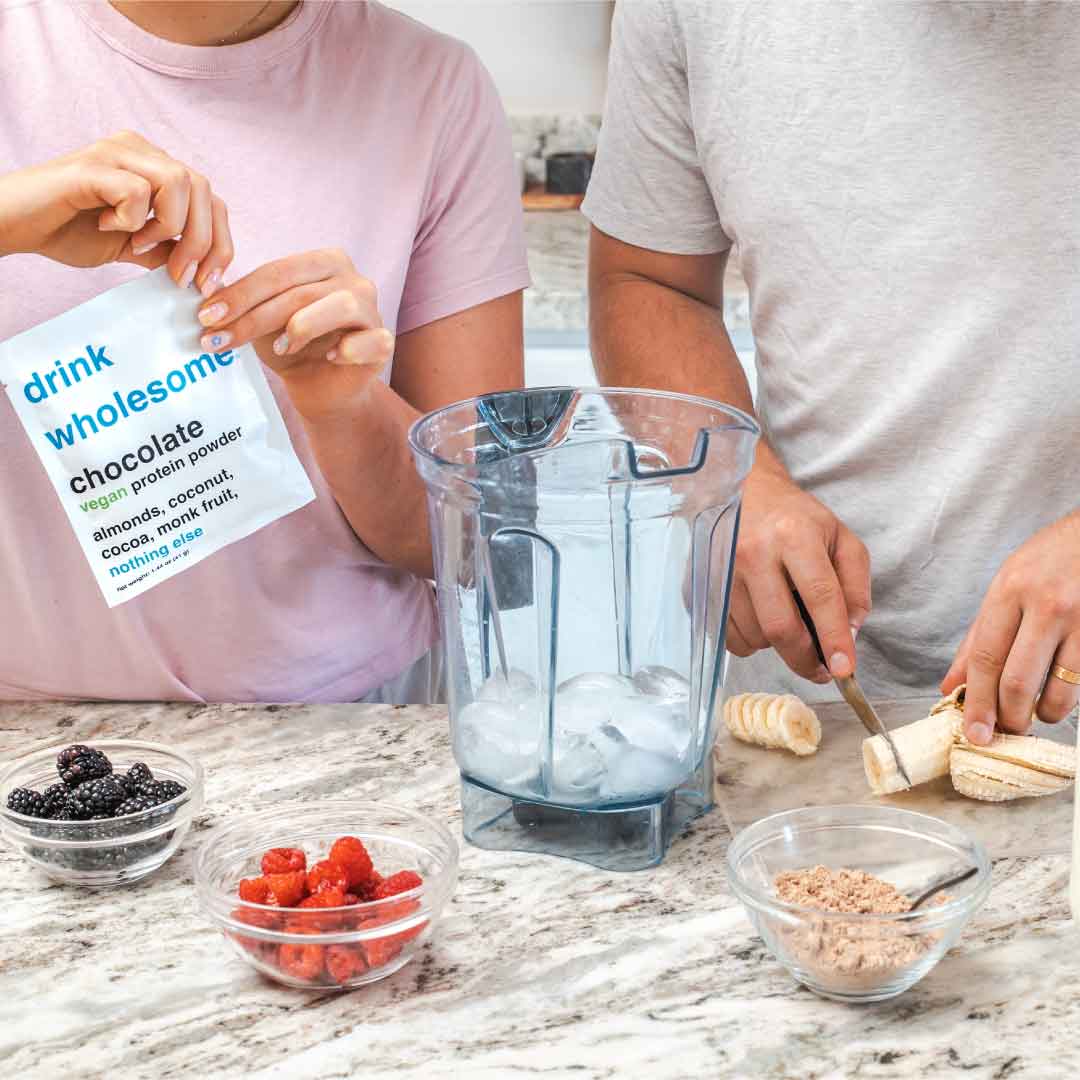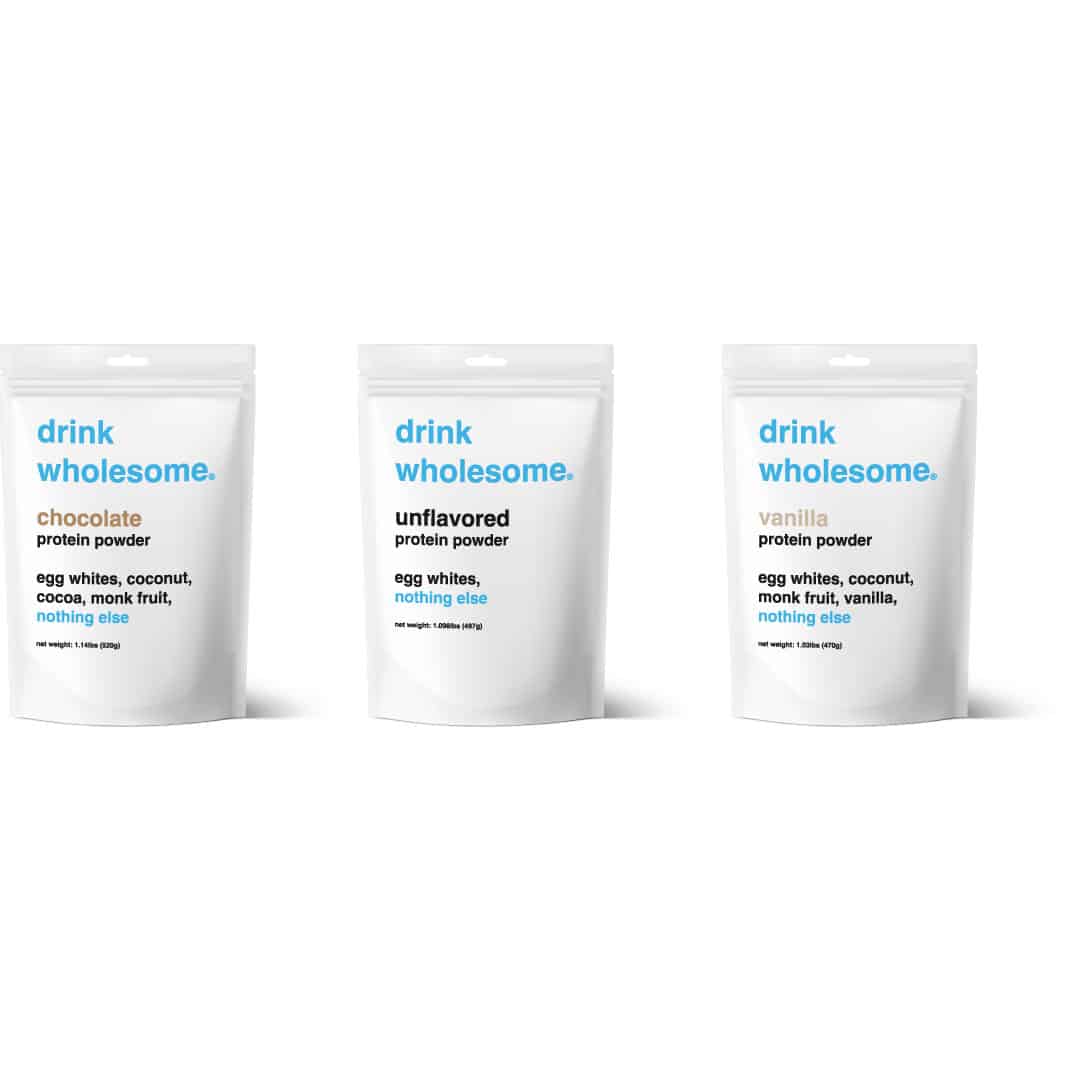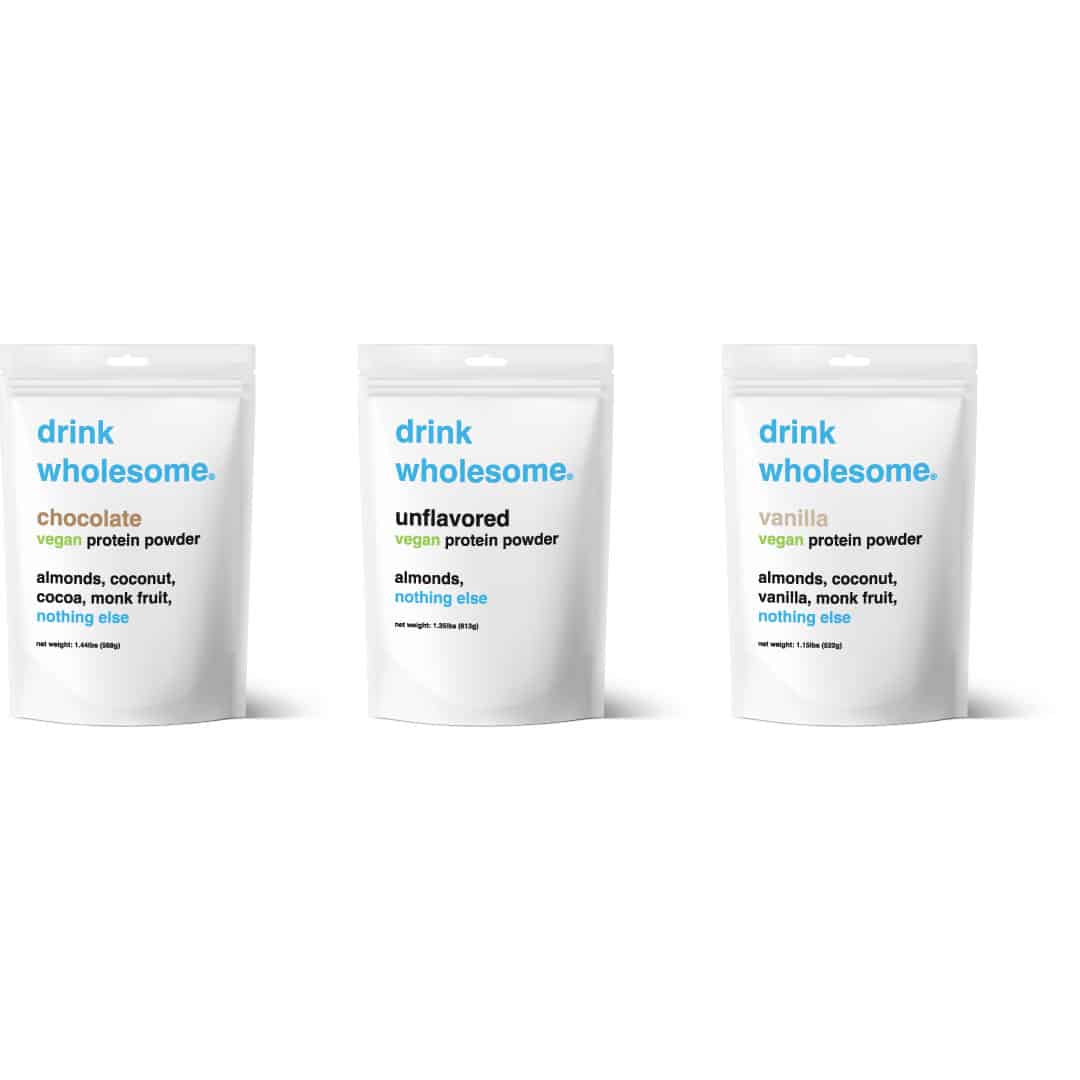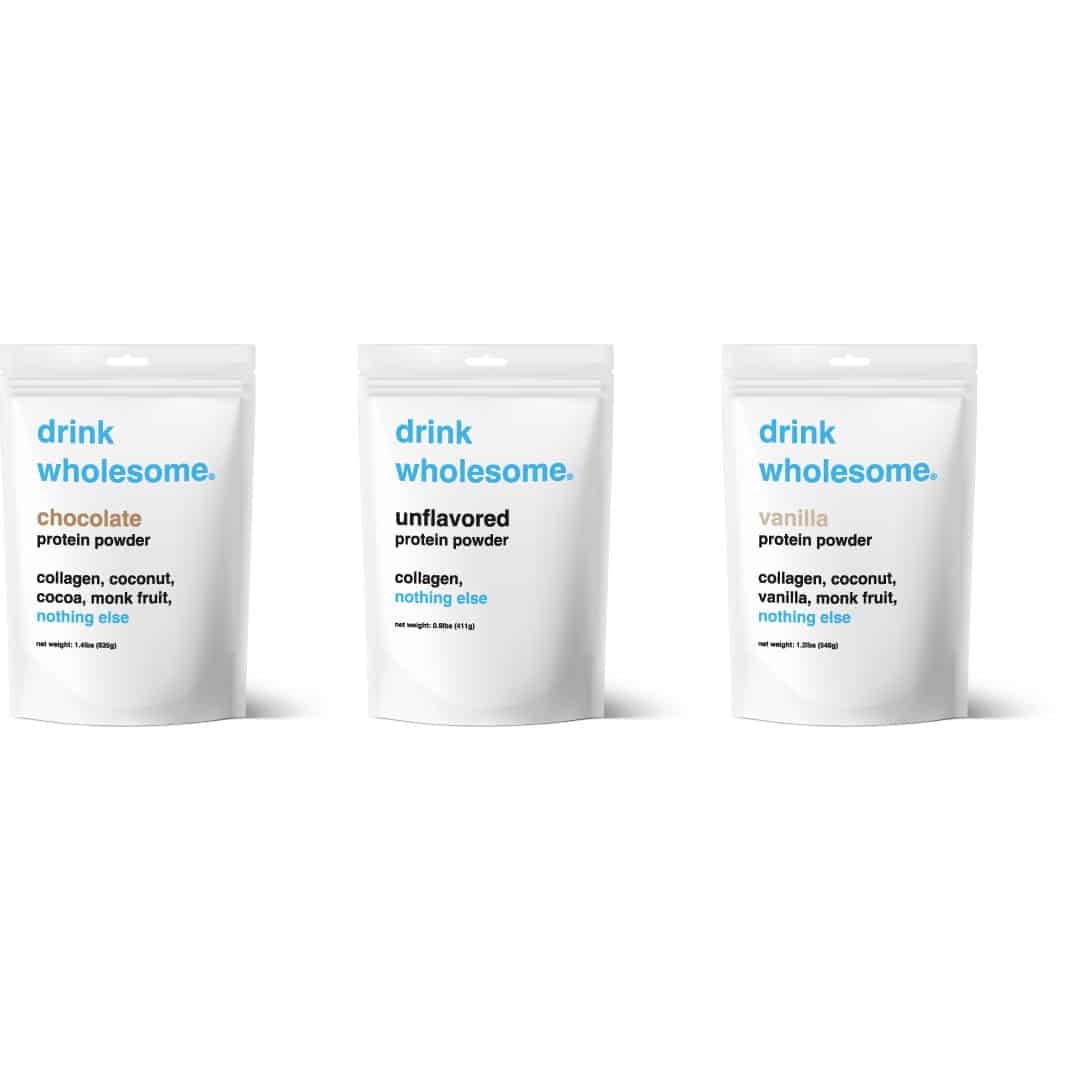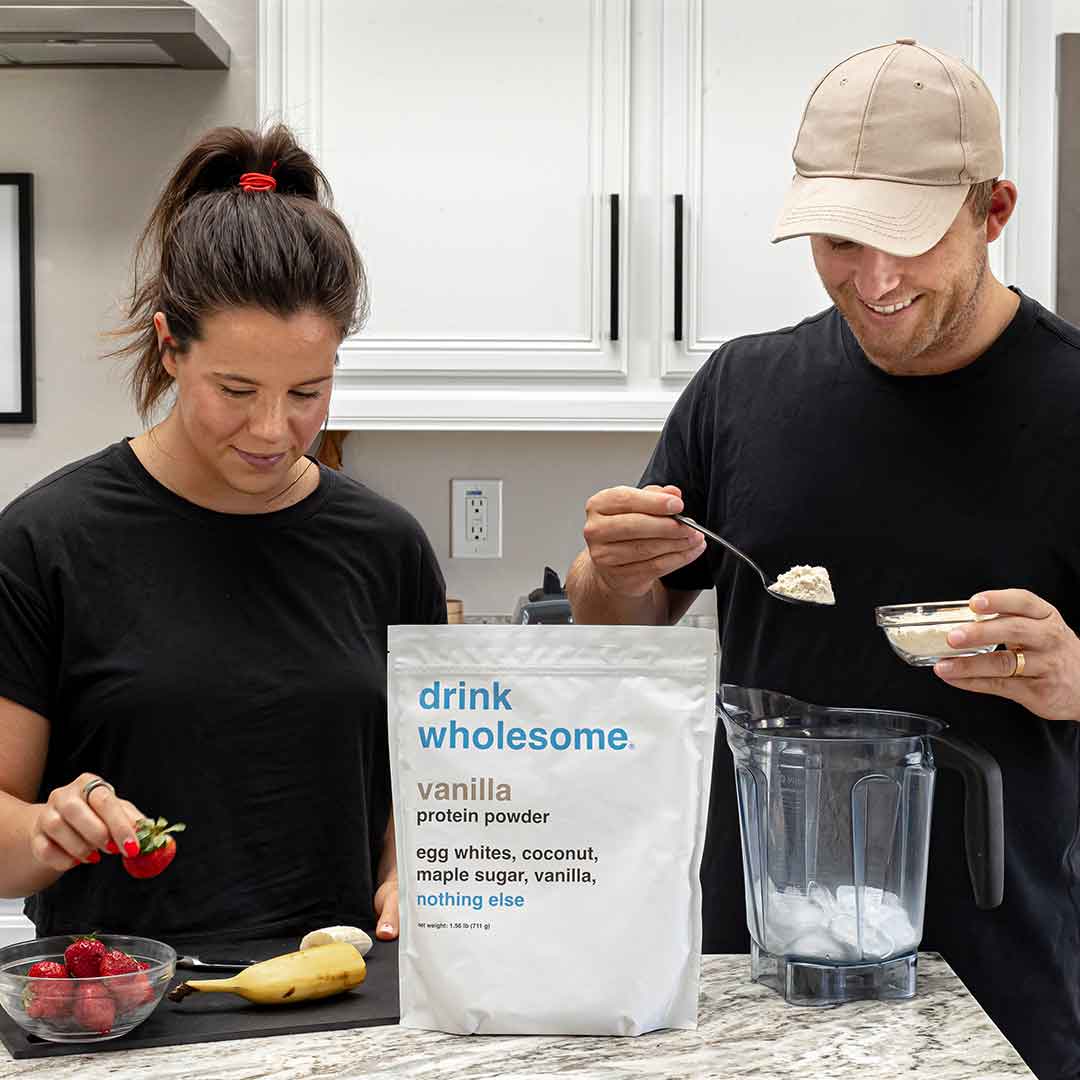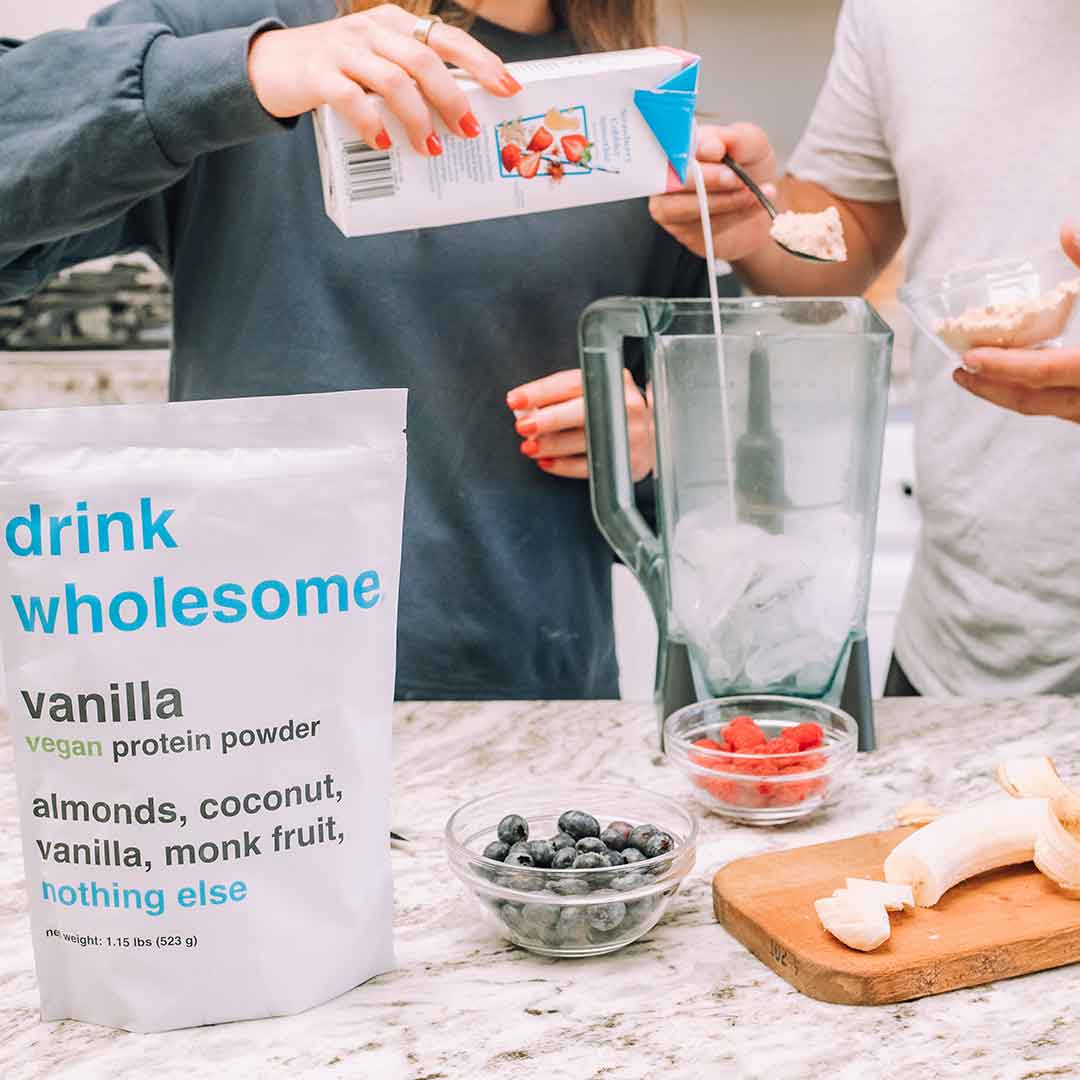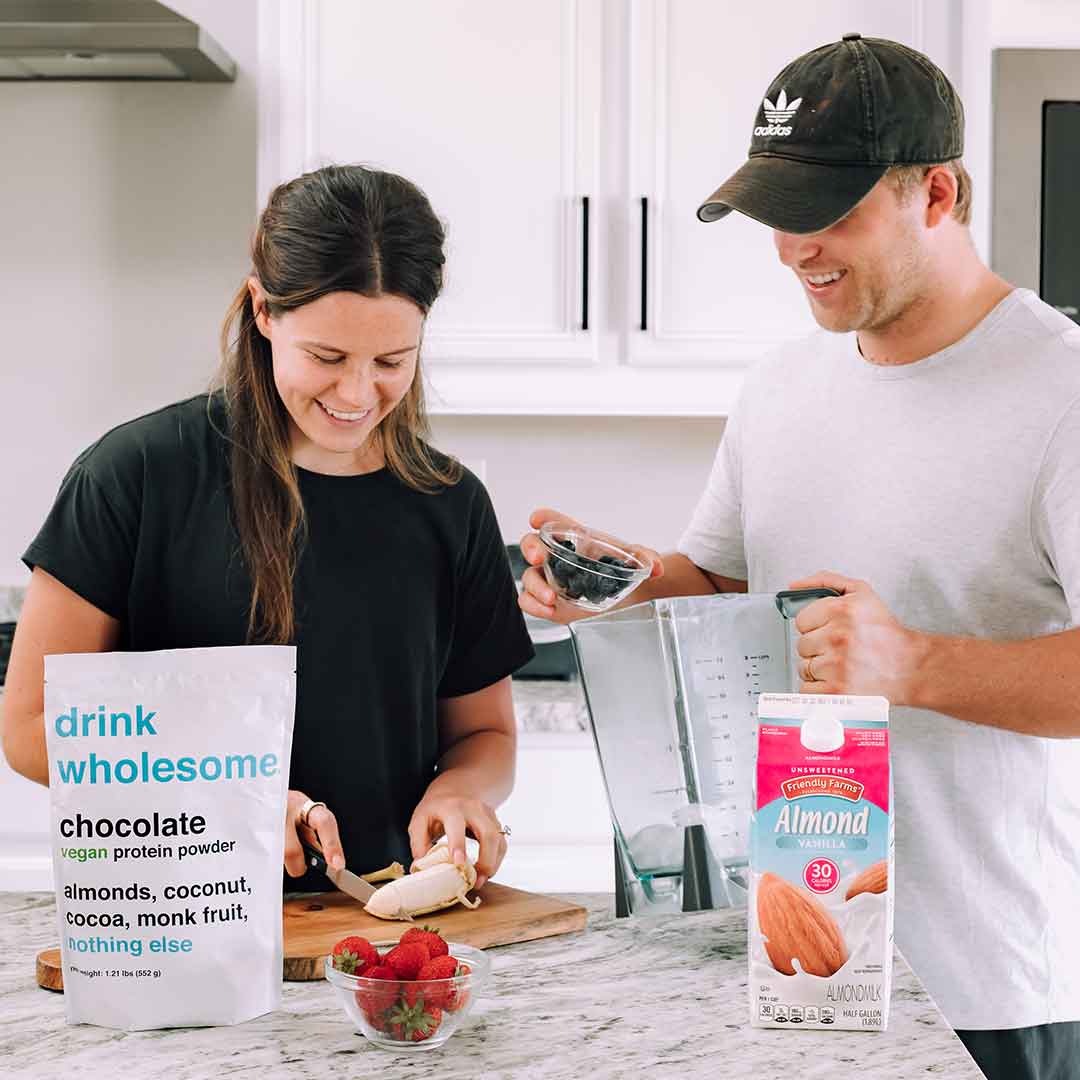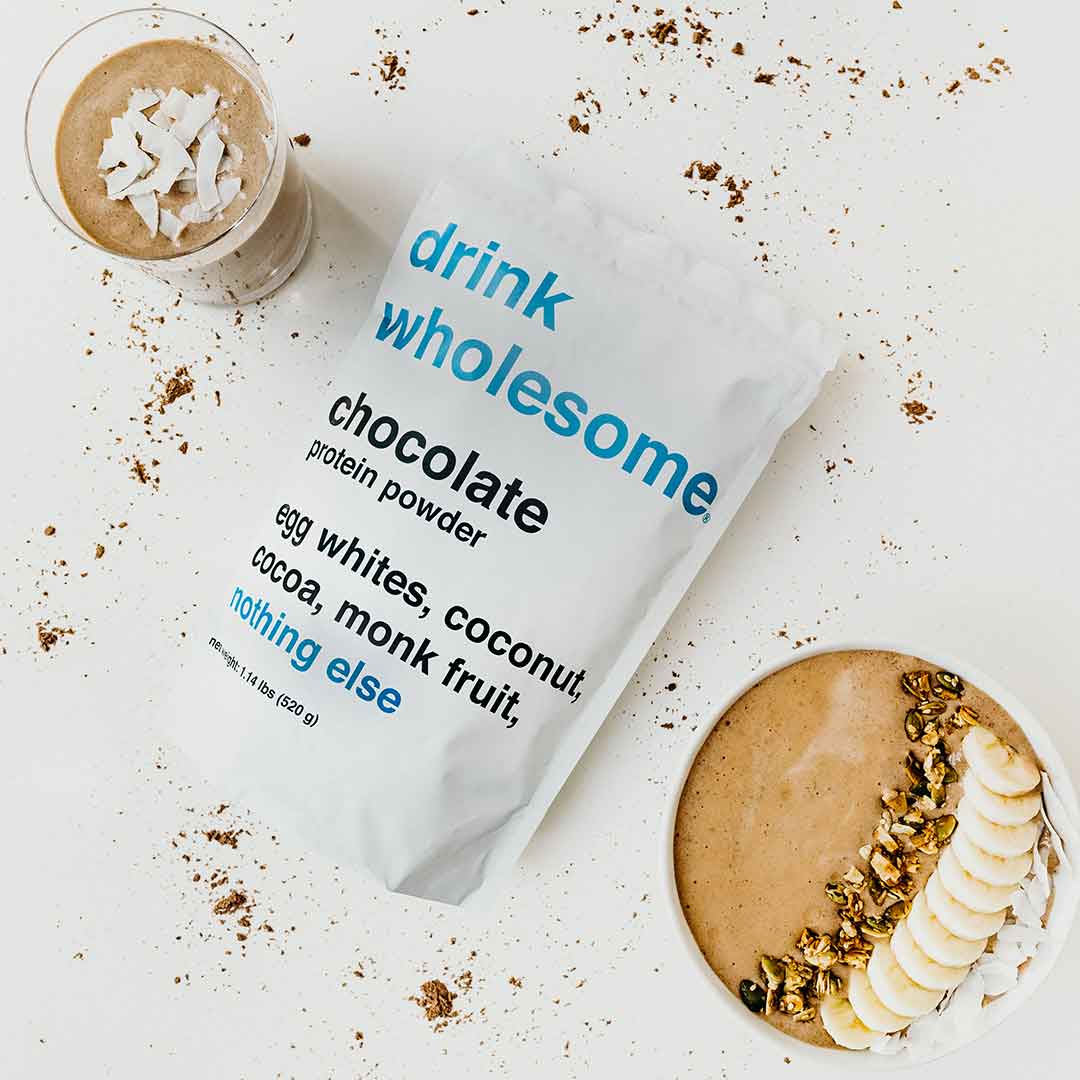What is the best lactose-free protein powder?
What is the best lactose-free protein powder? Keep reading to learn how to find a protein powder that will not upset your stomach.
Written by Jack Schrupp & Brittany Adelman, RDN
How to pick a lactose-free protein powder
What is lactose?
Lactose is a type of sugar formed when two other sugars, glucose and galactose, bond together. It is found in milk and dairy products such as yogurt, ice cream, and whey. It can also be found in many packaged foods, including medications and supplements.
What is lactose intolerance?
An enzyme called lactase is needed to digest lactose. Lactose intolerance occurs when the body does not produce enough of this enzyme. People who are lactose intolerant experience the following symptoms after consuming lactose:
– bloating
– diarrhea
– gas
– nausea
– stomach pain
It is estimated that two thirds of the world’s population suffers from lactose intolerance. If you suspect that you are lactose intolerant, you should consult with a healthcare professional for an accurate diagnosis. They may recommend tests such as a lactose intolerance breath test to confirm the condition.
What does lactose-free mean?
Lactose-free means that a product does not contain any lactose. Lactose-free protein powders are either dairy-free, or have been processed to remove the lactose.
Those with dairy-allergies should note that lactose-free does not mean dairy-free. A product can be lactose-free but still contain dairy. A dairy-free product, on the other hand, is necessarily lactose free. This distinction is important to understand, especially if you have a dairy allergy or sensitivity.
Does protein powder have lactose?
Whey, casein, and goat protein powder contain lactose because they are byproducts of cheese and yogurt making. If you are lactose intolerant, you should avoid these three types of protein powders.
Some whey protein concentrates and isolates have had most of the lactose removed, but this does not necessarily make them easier to digest. Straight from the cow, whey is 75% lactose. In order to strip-away all of that sugar, manufacturers rely on mechanical and chemical processing, turning your whey protein powder in a science experiment. This, in turn, can make it hard to break down.
It follows that if you are lactose intolerant, or if you have a sensitive stomach, you should just avoid protein powders that contain dairy. Food and supplement companies are required to label their products clearly if they contain dairy, so this should be easy. When reading a nutrition label, common allergens such as milk are usually emphasized in bold print. You do have to read the ingredient list closely, however, because some protein powders contain dairy-based food additives like sodium caseinate, which can contain small amounts of lactose.
Why use lactose-free protein powder?
Here are the top 3 reasons why you should use lactose-free protein powders:
1. Lactose can cause digestive issues. Most adults cannot fully digest lactose and experience painful side effects when they consume dairy-products.
2. Dairy-based proteins can cause acne. Dairy consumption stimulates the production of insulin and insulin-like growth factor, both of which have been linked to acne development.
3. Dairy-based proteins are not sustainable. The industrial dairy industry has a profound impact on the environment. Dairy cows and their manure produce enormous amounts of greenhouse gas emissions, the poor handling of manure and fertilizers pollute local water resources, and unsustainable dairy farming and feed production can also lead to the loss of ecologically important areas such as prairies, wetlands, and forests.
If finding an easy-to-digest protein powder is your top priority, then you should not be satisfied with lactose-free as lactose is by no means the only thing in protein powder that can upset your stomach. Continue reading to learn more.
Should you use lactose free protein powder? Advice from a registered dietitian:
Although most people with lactose intolerance can tolerate a little lactose, this is not the case for everyone, especially those navigating more complicated gastrointestinal disorders such as IBS, Chron’s, and SIBO. Lactose-free protein powder is thus recommended for individuals who have digestive issues, as it is a great way to boost your protein intake without upsetting your stomach. Registered dietitian, Brittany Adelman, shares her take on using lactose free protein powders with her clients:
“As someone who specializes in gut health, the topic of protein powder comes up a lot, as many individuals with digestive conditions struggle to eat enough protein. Protein powders that are lactose-free, but not necessarily dairy-free, can still cause a lot of digestive discomfort and promote inflammation in the gut, so I typically recommend protein powders that are dairy-free.” – Brittany Adelman, RDN
Additional things to consider when using lactose-free protein powder:
– Avoid high FODMAP and heavily-processed ingredients as they may exacerbate your gut issues.
– Be mindful of serving sizes and try not to consume more than the recommended amount.
– Understand your food triggers and work with a professional to identify them. Many at-home tests available are inaccurate, so not waste your time or money on tests unless they are ordered by a trained practitioner.
– Make sure you are enjoying your protein powder by experimenting with protein powder recipes.
– Add extra fiber to your smoothies and recipes. I like to add frozen riced cauliflower to my smoothies for easier digestion.
– Monitor your gut health and symptoms regularly, and adjust your protein powder consumption as needed.
As always, consult with your registered dietitian or healthcare professional for personalized guidance on incorporating lactose-free protein powder into your diet for optimal gut health.
What is the best protein powder that is lactose-free?
Any type of lactose-free protein (egg whites, hemp, peas, etc.) can help you increase your protein intake and achieve your nutritional goals. Not all lactose-free protein shakes are created equal, however.
If you study ingredient lists, you will find that most lactose-free protein shakes contain a cocktail of additives like emulsifiers, thickeners, flavors, and sugar substitutes. Ingredients like these can cause painful digestive issues.
The best lactose-free protein shakes are thus made with a short list of simple ingredients. By sticking to lactose-free protein sources and avoiding added junk, you can be sure that your protein shake will not cause any side effects.
drink wholesome is the best lactose-free protein powder
drink wholesome is additive-free
One of the reasons why I make the best lactose-free protein powder is that we do not use food additives like gums, lecithin, flavors, and artificial sweeteners. Even in small amounts, added ingredients like these can cause painful side effects, especially if you have a sensitive stomach.
the alternative: Protein Matrix Comprised of (Whey Protein Concentrate, Whey Protein Isolate, Calcium Caseinate, Micellar Casein, Milk Protein Isolate, Egg Albumen, Glutamine Peptides), Polydextrose, Sunflower Creamer (Sunflower Oil, Corn Syrup Solids, Sodium Caseinate, Mono- and Diglycerides, Dipotassium Phosphate, Tricalcium Phosphate, Soy Lecithin, Tocopherols), Natural and Artificial Flavor, MCT Powder (Medium Chain Triglycerides, Nonfat Dry Milk, Disodium Phosphate, Silicon Dioxide), Lecithin, Cellulose Gum, Salt, Yellow 5, Sucralose, Acesulfame Potassium, Papain, Bromelain
Food additives are hard to break down and thus feed your gut bacteria, which release gas as they eat. As you might imagine, too much intestinal gas can lead to bloating, flatulence, and stomach pain. Partially digested food additives also cause your colon to absorb too much water, which is a recipe for diarrhea. In case you were wondering, lactose causes side effects like bloating and diarrhea for the same reason that food additives do: it is hard to digest. Here is a list of the most common food additives in protein powder: acacia fiber, acacia gum, acesulfame potassium, artificial flavors, ascorbic acid, aspartame, calcium carbonate, carrageenan, cellulose gum, dextrin, dicalcium phosphate, dipotassium phosphate, erythritol, gellan gum, guar gum, gum arabic, inulin, locust bean gum, maltodextrin, mono- and diglycerides, ‘natural’ flavors, rice bran extract, rice dextrin, rice hulls, rosemary extract, silica, silicon dioxide, sodium alginate, sodium bicarbonate, soluble corn fiber, soy lecithin, sucralose, sunflower lecithin, tocopherols, tricalcium phosphate, xanthan gum, xylitol, zinc oxide Regularly eating food additives can cause serious gut health problems too. For instance, certain food additives can disturb regulatory pathways in your intestines, paving the way for the development of inflammatory bowel disease (IBD). Some food additives, especially artificial sweeteners and sugar alcohols, can also alter the composition of your gut microbiome – the collection of microorganisms living in your gut. An altered gut microbiome is a huge driver of inflammation and associated with the onset and progression of chronic digestive diseases. A final reason why we make the best protein powder that is lactose free is that we do not use protein concentrates or isolates. Nearly all other protein powders are made from one or both of these protein sources, which have been stripped of everything but the protein, including the enzymes, fiber, and other natural digestive aids that help you break them down. This not only makes them hard to digest, but may also disrupt your gut microbiome. As you just learned, this is a huge health concern as your gut microbiome plays a crucial role in protecting your body against pathogens and educating your immune system.
Instead of using protein concentrates or isolates, we make the best lactose-free protein powder\with whole food protein sources like egg whites and almonds. These are a gut-friendly alternative to protein concentrates and isolates. Almond are prebiotic, meaning they improve the composition of your gut microbiome. They also increase butyrate, a type of beneficial short-chain fatty acid, in the colon. Egg whites, on the other hand, can repair the mucosal intestinal barrier and reduce intestinal inflammation. They are also alkaline (they maintain healthy pH levels in your gut), bioactive (they promote the growth of good gut bacteria), and low FODMAP (suitable for people with IBS). In short, if you need a lactose-free protein powder that will not upset your stomach, you have come to the right place. Order samples to see if our protein powders are right for you. There are several ways to easily incorporate lactose-free protein powder into your diet. For example, you can add it to smoothies and pancakes. Check out my favorite ways to use lactose-free protein powder below: Ingredients (makes 1 smoothie): – 1 medium banana (tip: greener bananas are lower in FODMAPs and easier on the gut) – 2 tablespoons almond butter (unsweetened) – 1 tablespoon hemp seeds – 3 tablespoons drink wholesome lactose-free protein powder – 1 cup unsweetened almond milk – handful ice cubes (optional) Instructions: Peel the ripe banana and break it into chunks. In a blender, combine the banana, almond butter, hemp seeds, lactose-free protein powder, and unsweetened almond milk. If desired, add a handful of ice cubes for a colder and thicker smoothie. Blend the ingredients until smooth and creamy, ensuring that the protein powder is fully incorporated. Taste the smoothie and adjust the sweetness or thickness by adding more almond milk or sweetener if needed. Pour the smoothie into a glass and enjoy! Ingredients (makes 4 pancakes): – 3 tablespoons drink wholesome lactose-free protein powder – 1/2 cup almond flour – 2 tablespoons coconut flour – 1 teaspoon baking powder – 1 teaspoon vanilla extract – 1/4 teaspoon salt – 1 pinch cinnamon – 2 large eggs – 1/2 cup unsweetened almond milk (or milk of choice) – 1 tablespoon melted coconut oil – 1/4 cup blueberries – 1 tbsp crushed walnuts – 1 tbsp maple syrup Instructions: In a mixing bowl, combine the lactose-free protein powder, almond flour, coconut flour, baking powder, salt, and cinnamon. Mix well to ensure there are no lumps. In a separate bowl, whisk together the eggs, almond milk, melted coconut oil or butter, and vanilla extract. Pour the wet ingredients into the dry ingredients and stir until you have a smooth pancake batter. Let the batter rest for about 5 minutes to allow the coconut flour to absorb the liquid. Heat a non-stick skillet or griddle over medium heat and lightly grease it with coconut oil or cooking spray. Pour about 1/4 cup of the pancake batter onto the hot skillet to form a pancake. Cook for 2-3 minutes on one side until bubbles form on the surface, then flip and cook for another 1-2 minutes until golden brown. Repeat with the remaining batter, adjusting the heat if necessary to prevent burning. Serve the protein pancakes warm and top with fresh blueberries, crushed walnuts, and a drizzle of maple syrup. “I have problems digesting whey / lactose products…always bloated with horrible other symptoms…I tried ALL vegan protein powders and just about every whey isolate powder available…NONE helped…I also have issues with sugar alcohols…I love this product and I LOVE supporting small businesses…thank you for creating a wonderful product that blends and taste good ( truly a bonus )!” – Tammy This content is not intended to be a substitute for professional medical advice, diagnosis, or treatment. drink wholesome is not intended to diagnose, treat, cure or prevent any disease.drink wholesome is made with real foods
What are the best ways to use lactose-free protein powder?
Lactose-free banana and almond butter smoothie
Blueberry protein pancakes



